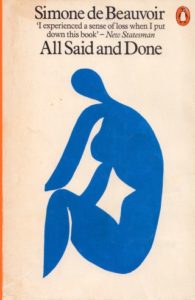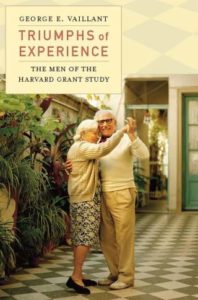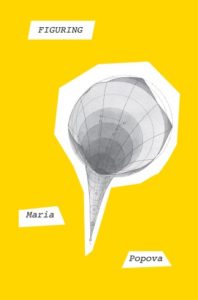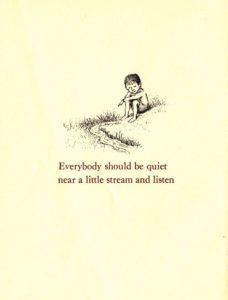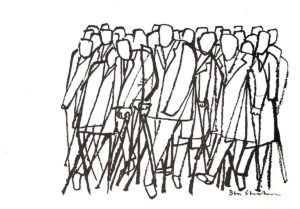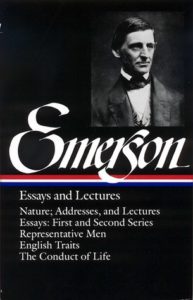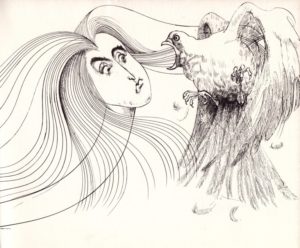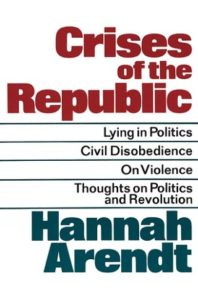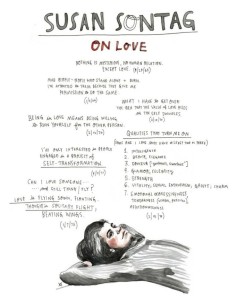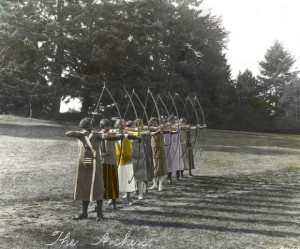Brainpickings
Constellation of Chance & Choice
January 9, 2020“My life … runs back through time and space to the very beginnings of the world and to its utmost limits. In my being I sum up the earthly inheritance and the state of the world at this moment.”
Maria Popova: Perhaps our most acute awareness of the lacuna between the one life we do have and all the lives we could have had comes in the grips of our fear of missing out — those sudden and disorienting illuminations in which we recognize that parallel possibilities exists alongside our present choices. “Our lived lives might become a protracted mourning for, or an endless tantrum about, the lives we were unable to live,” wrote the psychoanalyst Adam Phillips in his elegant case for the value of our unlived lives. “But the exemptions we suffer, whether forced or chosen, make us who we are.”
The garland of those exemptions strews our sense of self — our constellating experience of personal identity which, as the poet and philosopher John O’Donohue so incisively observed,”is not merely an empirical process of appropriating or digesting blocks of life.”
No one has captured that ultimate existential awareness more beautifully, nor with greater nuance, than the trailblazing French existentialist philosopher and feminist Simone de Beauvoir (January 9, 1908–April 14, 1986)
The penetration of that particular ovum by that particular spermatozoon, with its implications of the meeting of my parents and before that of their birth and the births of all their forebears, had not one chance in hundreds of millions of coming about. And it was chance, a chance quite unpredictable in the present state of science, that caused me to be born a woman. From that point on, it seems to me that a thousand different futures might have stemmed from every single movement of my past: I might have fallen ill and broken off my studies; I might not have met Sartre; anything at all might have happened.
Tossed into the world, I have been subjected to its laws and its contingencies, ruled by wills other than my own, by circumstance and by history: it is therefore reasonable for me to feel that I am myself contingent. What staggers me is that at the same time I am not contingent.
If I had not been born no question would have arisen: I have to take the fact that I do exist as my starting point.
To be sure, the future of the woman I have been may turn me into someone other than myself. But in that case it would be this other woman who would be asking herself who she was. For the person who says “Here am I” there is no other coexisting possibility. Yet this necessary coincidence of the subject and his history is not enough to do away with my perplexity. My life: it is both intimately known and remote; it defines me and yet I stand outside it.
Chance … has a distinct meaning for me. I do not know where I might have been led by the paths that, as I look back, I think I might have taken but that in fact I did not take. What is certain is that I am satisfied with my fate and that I should not want it changed in any way at all. So I look upon these factors that helped me to fulfill it as so many fortunate strokes of chance.
https://www.brainpickings.org/2017/01/06/simone-de-beauvoir-all-said-and-done-chance-choice/
75-Year Study: “Good relationships keep us happier and healthier.”
May 17, 2019
Maria Popova/BrainPickings
“The good life is one inspired by love and guided by knowledge.”
Bertrand Russell
“The Study of Adult Development at the Harvard Medical School, better known as the Grant Study — the longest-running study of human happiness. Beginning in 1938 as a counterpoint to the disease model of medicine, the ongoing research set out to illuminate the conditions that enhance wellbeing by following the lives of 268 healthy sophomores from the Harvard classes between 1939 and 1944. It was a project revolutionary in both ambition and impact, nothing like it done before or since.
[…]
Little progress had been made since Walt Whitman’s prescient case for the grossly underserved human factors in healthcare and the question of what makes for a good life was cautiously left to philosophy. It’s hard for the modern mind to grasp just how daring it was for physicians to attempt to address it.
But that’s precisely what the Harvard team did. There are, of course, glaring limitations to the study — ones that tell the lamentable story of our cultural history: the original subjects were privileged white men. Nonetheless, the findings furnish invaluable insight into the core dimensions of human happiness and life satisfaction: who lives to ninety and why, what predicts self-actualization and career success, how the interplay of nature and nurture shapes who we become.”
“In this illuminating TED talk, Harvard psychologist and Grant Study director Robert Waldinger — the latest of four generations of scientists working on the project — shares what this unprecedented study has revealed, with the unflinching solidity of 75 years of data, about the building blocks of happiness, longevity, and the meaningful life.”
Margaret Fuller, 1810-1850
January 15, 2019This country… needs… no thin Idealist, no coarse Realist, but a man whose eye reads the heavens, while his feet step firmly on the ground, and his hands are strong and dexterous for the use of human implements… a man of universal sympathies, but self-possessed; a man who knows the region of emotion, though he is not its slave; a man to whom this world is no mere spectacle or fleeting shadow, but a great, solemn game, to be played with good heed, for its stakes are of eternal value, yet who, if his play be true, heeds not what he loses by the falsehood of others; a man who hives from the past, yet knows that its honey can but moderately avail him; whose comprehensive eye scans the present, neither infatuated by its golden lures, nor chilled by its many ventures; who possesses prescience, the gift which discerns tomorrow — when there is such a man for America, the thought which urges her on will be expressed.
From Maria Popova:
‘At age six, Margaret Fuller was reading in Latin. At twelve, she was conversing with her father in philosophy and pure mathematics. By fifteen, she had mastered French, Italian, and Greek, and was reading two or three lectures in philosophy every morning for mental discipline. In her short life, Fuller — one of the central figures in my book Figuring, and the person whom Emerson considered his greatest influence — would go on to write the foundational treatise of American women’s emancipation movement, author the most trusted literary and art criticism in America, work as the first female editor for a major New York newspaper and the only woman in the newsroom, advocate for prison reform and African American voting rights, and become America’s first foreign war correspondent, trekking through war-torn Rome while seven months pregnant. In her advocacy for African American, Native American, and women’s rights, Fuller would ardently espouse the simple, difficult truth that “while any one is base, none can be entirely free and noble.”
Ursula K.Le Guin: the invention of women, when when every woman was man.
Fuller left her native New England to journey westward into the largely unfathomed frontiers of the country. She returned home transformed, awakened to new social, political, and existential realities. Eager to supplement her observations with historical research, she persuaded the Harvard library to grant her access to its book collection — the largest in the nation. No woman had previously been admitted for more than a tour. She then set about relaying her impressions and insights, ranging from a stunning portrait of Niagara Falls to a poignant account of the fate of the displaced Native American tribes with whom she sympathized and spent time. This became Fuller’s first book, Summer on the Lakes — part travelogue, part anthropological study, and part political treatise.’
2.5.19
Maria:
Figuring explores the complexities, varieties, and contradictions of love, and the human search for truth, meaning, and transcendence, through the interwoven lives of several historical figures across four centuries — beginning with the astronomer Johannes Kepler, who discovered the laws of planetary motion, and ending with the marine biologist and author Rachel Carson, who catalyzed the environmental movement. Stretching between these figures is a cast of artists, writers, and scientists — mostly women, mostly queer — whose public contribution has risen out of their unclassifiable and often heartbreaking private relationships to change the way we understand, experience, and appreciate the universe. Among them are the astronomer Maria Mitchell, who paved the way for women in science; the sculptor Harriet Hosmer, who did the same in art; the journalist and literary critic Margaret Fuller, who sparked the feminist movement; and the poet Emily Dickinson.
Emanating from these lives are larger questions about the measure of a good life and what it means to leave a lasting mark of betterment on an imperfect world: Are achievement and acclaim enough for happiness? Is genius? Is love? Weaving through the narrative is a set of peripheral figures — Ralph Waldo Emerson, Charles Darwin, Elizabeth Barrett Browning, Herman Melville, Frederick Douglass, Caroline Herschel, Nathaniel Hawthorne, Walt Whitman — and a tapestry of themes spanning music, feminism, the history of science, the rise and decline of religion, and how the intersection of astronomy, poetry, and Transcendentalist philosophy fomented the environmental movement.
Prelude:
How can we know this and still succumb to the illusion of separateness, of otherness? This veneer must have been what the confluence of accidents and atoms known as Dr. Martin Luther King, Jr., saw through when he spoke of our “inescapable network of mutuality,” what Walt Whitman punctured when he wrote that “every atom belonging to me as good belongs to you.”
There are infinitely many kinds of beautiful lives.
So much of the beauty, so much of what propels our pursuit of truth, stems from the invisible connections — between ideas, between disciplines, between the denizens of a particular time and a particular place, between the interior world of each pioneer and the mark they leave on the cave walls of culture, between faint figures who pass each other in the nocturne before the torchlight of a revolution lights the new day, with little more than a half-nod of kinship and a match to change hands.
Labor’s Day of Repose
September 4, 2017‘Leisure lives on affirmation. It is not the same as the absence of activity…or even as an inner quiet. It is rather like the stillness int he conversation of lovers, which is fed by their oneness.’
︶⁀°• •° ⁀︶
Maria Popova:
“We get such a kick out of looking forward to pleasures and rushing ahead to meet them that we can’t slow down enough to enjoy them when they come,” Alan Watts observed in 1970, aptly declaring us “a civilization which suffers from chronic disappointment.” Two millennia earlier, Aristotle asserted “This is the main question, with what activity one’s leisure is filled.”
[…]
So how did we end up so conflicted about cultivating a culture of leisure?
In 1948, only a year after the word “workaholic” was coined in Canada and a year before an American career counselor issued the first concentrated countercultural clarion call for rethinking work, the German philosopher Josef Pieper (May 4, 1904–November 6, 1997) penned Leisure, the Basis of Culture (public library) — a magnificent manifesto for reclaiming human dignity in a culture of compulsive workaholism, triply timely today, in an age when we have commodified our aliveness so much as to mistake making a living for having a life.
In a sentiment Pico Iyer would come to echo more than half a century later in his excellent treatise on the art of stillness, Pieper adds:
Leisure is a form of that stillness that is necessary preparation for accepting reality; only the person who is still can hear, and whoever is not still, cannot hear. Such stillness is not mere soundlessness or a dead muteness; it means, rather, that the soul’s power, as real, of responding to the real — a co-respondence, eternally established in nature — has not yet descended into words. Leisure is the disposition of perceptive understanding, of contemplative beholding, and immersion — in the real.
But there is something else, something larger, in this conception of leisure as “non-activity” — an invitation to commune with the immutable mystery of being. Pieper writes:
In leisure, there is … something of the serenity of “not-being-able-to-grasp,” of the recognition of the mysterious character of the world, and the confidence of blind faith, which can let things go as they will.
[…]
Leisure is not the attitude of the one who intervenes but of the one who opens himself; not of someone who seizes but of one who lets go, who lets himself go, and “go under,” almost as someone who falls asleep must let himself go… The surge of new life that flows out to us when we give ourselves to the contemplation of a blossoming rose, a sleeping child, or of a divine mystery — is this not like the surge of life that comes from deep, dreamless sleep?
[full article at brain pickings.org]
Emerson & the tyranny of the masses.
May 11, 2017“Masses are rude, lame, unmade, pernicious in their demands and influence; I wish not to concede anything to them, but to tame, drill, divide, and break them up, and draw individuals out of them”
Maria Popova/brainpickings
When you adopt the standards and the values of someone else,” Eleanor Roosevelt wrote in her timeless meditation on happiness and conformity, “you surrender your own integrity [and] become, to the extent of your surrender, less of a human being.” And yet we exist within a society, as individual particles that coagulate into the so-called masses, awash in societal standards that often permeate our consciousness without our conscious consent or even awareness. How, then, do we mediate between the inescapable social dimension of our lives and the unassailable integrity of individual personhood?
Wedged in time between Søren Kierkegaard’s keen insight into the psychology of conformity and Nobel laureate Elias Canetti’s incisive treatise on crowds and powerwas another intellectual titan of the human spirit, Ralph Waldo Emerson (May 25, 1803–April 27, 1882), who addressed this question in an essay titled “Considerations by the Way,” found in his indispensable Essays and Lectures (public library | free download).
With spirited disdain for conformity, Emerson writes:
Leave this hypocritical prating about the masses. Masses are rude, lame, unmade, pernicious in their demands and influence, and need not to be flattered but to be schooled. I wish not to concede anything to them, but to tame, drill, divide, and break them up, and draw individuals out of them… Masses! the calamity is the masses. I do not wish any mass at all, but honest men only, lovely, sweet, accomplished women only, and no shovel-handed, narrow-brained, gin-drinking million stockingers or lazzaroni at all. If government knew how, I should like to see it check, not multiply the population. When it reaches its true law of action, every man that is born will be hailed as essential. Away with this hurrah of masses, and let us have the considerate vote of single men spoken on their honor and their conscience.
[…]
The majority are unripe, and have not yet come to themselves, do not yet know their opinion. That, if they knew it, is an oracle for them and for all.
But Emerson is careful to recognize that such ripeness of conscience and character, which aligns with Einstein’s notion of “spiritual genius,” isn’t evenly distributed among the population — the most honorable and conscious individuals, he argues, are rare to come by, yet they are the ones responsible for humanity’s greatest and most lasting feats of creativity and intellect. More than a century before Jacob Bronowski asserted that “the creative personality is always one that looks on the world as fit for change and on himself as an instrument for change,” Emerson writes:
Nature makes fifty poor melons for one that is good, and shakes down a tree full of gnarled, wormy, unripe crabs, before you can find a dozen dessert apples… Nature works very hard, and only hits the white [of the bull’s eye] once in a million throws. In mankind, she is contented if she yields one master in a century. The more difficulty there is in creating good men, the more they are used when they come… All revelations, whether of mechanical or intellectual or moral science, are made not to communities, but to single persons. All the marked events of our day, all the cities, all the colonizations, may be traced back to their origin in a private brain. All the feats which make our civility were the thoughts of a few good heads.
The hope, of course, is that in the century and a half since Emerson’s day — a time when such “good heads” belonged only to white men — we have created and must continue to create more and more opportunities for greatness across all sections of the population, so that the revolutionary “revelations” Emerson extols may come from a kaleidoscope of perspectives, building toward a more beautiful and just humanity. But such a mission would only succeed on the wings of the same necessary rejection of mob mentality, the same dismantling of the mindless masses into thinking individuals, that Emerson himself so spiritedly espoused.
On Dialogue
February 24, 2017[Ralph Steadman art]
In spite of this worldwide system of linkages, there is, at this very moment, a general feeling that communication is breaking down everywhere, on an unparalleled scale…what appears [in the media] is generally at best a collection of trivial and almost unrelated fragments, while at worst, it can often be a really harmful source of confusion and misinformation.
He terms this “the problem of communication” and writes:
Different groups … are not actually able to listen to each other. As a result, the very attempt to improve communication leads frequently to yet more confusion, and the consequent sense of frustration inclines people ever further toward aggression a and violence, rather than toward mutual understanding and trust.
More from Maria Papova/brainpickings and David Bohm:
“It is clear that if we are to live in harmony with ourselves and with nature, we need to be able to communicate freely in a creative movement in which no one permanently holds to or otherwise defends his own ideas.
Language is collective. Most of our basic assumptions come from our society, including all our assumptions about how society works, about what sort of person we are supposed to be, and about relationships, institutions, and so on. Therefore we need to pay attention to thought both individually and collectively.
“Dialogue” comes from the Greek word dialogos. Logos means “the word,” or in our case we would think of the “meaning of the word.” And dia means “through” — it doesn’t mean “two.” A dialogue can be among any number of people, not just two. Even one person can have a sense of dialogue within himself, if the spirit of the dialogue is present. The picture or image that this derivation suggests is of a stream of meaning flowing among and through us and between us. This will make possible a flow of meaning in the whole group, out of which may emerge some new understanding. It’s something new, which may not have been in the starting point at all. It’s something creative. And this shared meaning is the “glue” or “cement” that holds people and societies together.
Contrast this with the word “discussion,” which has the same root as “percussion” and “concussion.” It really means to break things up. It emphasizes the idea of analysis, where there may be many points of view, and where everybody is presenting a different one — analyzing and breaking up. That obviously has its value, but it is limited, and it will not get us very far beyond our various points of view. Discussion is almost like a ping-pong game, where people are batting the ideas back and forth and the object of the game is to win or to get points for yourself…
In a dialogue, however, nobody is trying to win. Everybody wins if anybody wins. There is a different sort of spirit to it. In a dialogue, there is no attempt to gain points, or to make your particular view prevail. Rather, whenever any mistake is discovered on the part of anybody, everybody gains. It’s a situation called win-win, whereas the other game is win-lose — if I win, you lose. But a dialogue is something more of a common participation, in which we are not playing a game against each other, but with each other. In a dialogue, everybody wins.”
https://www.brainpickings.org/2016/12/05/david-bohm-on-dialogue/
Lying in politics.
January 15, 2017‘Nowhere is this liar’s loss of perspective more damaging to public life, human possibility, and our collective progress than in politics, where complex social, cultural, economic, and psychological forces conspire to make the assault on truth traumatic on a towering scale.’
Arendt considers one particularly pernicious breed of liars — “public-relations managers in government who learned their trade from the inventiveness of Madison Avenue.”
[Note: e.g. the Pentagon budgets $5 B for PR]
In a sentiment arguably itself defeated by reality — a reality in which someone like Donald Trump sells enough of the public on enough falsehoods to get gobsmackingly close to the presidency — she writes:
The only limitation to what the public-relations man does comes when he discovers that the same people who perhaps can be “manipulated” to buy a certain kind of soap cannot be manipulated — though, of course, they can be forced by terror — to “buy” opinions and political views. Therefore the psychological premise of human manipulability has become one of the chief wares that are sold on the market of common and learned opinion.
In what is possibly the finest parenthetical paragraph ever written, and one of particularly cautionary splendor today, Arendt adds:
(Oddly enough, the only person likely to be an ideal victim of complete manipulation is the President of the United States. Because of the immensity of his job, he must surround himself with advisers … who “exercise their power chiefly by filtering the information that reaches the President and by interpreting the outside world for him.” The President, one is tempted to argue, allegedly the most powerful man of the most powerful country, is the only person in this country whose range of choices can be predetermined. This, of course, can happen only if the executive branch has cut itself off from contact with the legislative powers of Congress; it is the logical outcome in our system of government when the Senate is being deprived of, or is reluctant to exercise, its powers to participate and advise in the conduct of foreign affairs. One of the Senate’s functions, as we now know, is to shield the decision-making process against the transient moods and trends of society at large — in this case, the antics of our consumer society and the public-relations managers who cater to it.)
Arendt turns to the role of falsehood, be it deliberate or docile, in the craftsmanship of what we call history:
Unlike the natural scientist, who deals with matters that, whatever their origin, are not man-made or man-enacted, and that therefore can be observed, understood, and eventually even changed only through the most meticulous loyalty to factual, given reality, the historian, as well as the politician, deals with human affairs that owe their existence to man’s capacity for action, and that means to man’s relative freedom from things as they are. Men who act, to the extent that they feel themselves to be the masters of their own futures, will forever be tempted to make themselves masters of the past, too. Insofar as they have the appetite for action and are also in love with theories, they will hardly have the natural scientist’s patience to wait until theories and hypothetical explanations are verified or denied by facts. Instead, they will be tempted to fit their reality — which, after all, was man-made to begin with and thus could have been otherwise — into their theory, thereby mentally getting rid of its disconcerting contingency.
This squeezing of reality into theory, Arendt admonishes, is also a centerpiece of the political system, where the inherent complexity of reality is flattened into artificial oversimplification:
Much of the modern arsenal of political theory — the game theories and systems analyses, the scenarios written for imagined “audiences,” and the careful enumeration of, usually, three “options” — A, B, C — whereby A and C represent the opposite extremes and B the “logical” middle-of-the-road “solution” of the problem — has its source in this deep-seated aversion. The fallacy of such thinking begins with forcing the choices into mutually exclusive dilemmas; reality never presents us with anything so neat as premises for logical conclusions. The kind of thinking that presents both A and C as undesirable, therefore settles on B, hardly serves any other purpose than to divert the mind and blunt the judgment for the multitude of real possibilities.
But even more worrisome, Arendt cautions, is the way in which such flattening of reality blunts the judgment of government itself — nowhere more aggressively than in the overclassification of documents, which makes information available only to a handful of people in power and, paradoxically, not available to the representatives who most need that information in order to make decisions in the interest of the public who elected them. Arendt writes:
Not only are the people and their elected representatives denied access to what they must know to form an opinion and make decisions, but also the actors themselves, who receive top clearance to learn all the relevant facts, remain blissfully unaware of them. And this is so not because some invisible hand deliberately leads them astray, but because they work under circumstances, and with habits of mind, that allow them neither time nor inclination to go hunting for pertinent facts in mountains of documents, 99½ per cent of which should not be classified and most of which are irrelevant for all practical purposes.
[…]
If the mysteries of government have so befogged the minds of the actors themselves that they no longer know or remember the truth behind their concealments and their lies, the whole operation of deception, no matter how well organized its “marathon information campaigns,” in Dean Rusk’s words, and how sophisticated its Madison Avenue gimmickry, will run aground or become counterproductive, that is, confuse people without convincing them. For the trouble with lying and deceiving is that their efficiency depends entirely upon a clear notion of the truth that the liar and deceiver wishes to hide. In this sense, truth, even if it does not prevail in public, possesses an ineradicable primacy over all falsehoods.
She extrapolates the broader human vulnerability to falsehood:
The deceivers started with self-deception.
[…]
The self-deceived deceiver loses all contact with not only his audience, but also the real world, which still will catch up with him, because he can remove his mind from it but not his body.
-Maria Papova/brainpickings
On love.
November 1, 2016Maria Papova.
March 13, 2016‘Mastery is not merely a commitment to a goal, but to a curved-line, constant pursuit.’
-Sarah Lewis
(‘Sarah received her bachelor’s degree from Harvard, an M. Phil from Oxford University, and her Ph.D. from Yale University in the History of Art.’)
